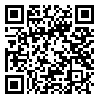Volume 17, Issue 4 (10-2023)
payavard 2023, 17(4): 373-386 |
Back to browse issues page
Ethics code: IR.SBMU.RETECH.REC.1402.011
Download citation:
BibTeX | RIS | EndNote | Medlars | ProCite | Reference Manager | RefWorks
Send citation to:



BibTeX | RIS | EndNote | Medlars | ProCite | Reference Manager | RefWorks
Send citation to:
Moghaddasi H, Asadi F, Hosseini A, Nouri Tahneh M. Presenting the Document of Standards for Producing Hospital Information System Software. payavard 2023; 17 (4) :373-386
URL: http://payavard.tums.ac.ir/article-1-7593-en.html
URL: http://payavard.tums.ac.ir/article-1-7593-en.html
1- Professor of Health Information Management and Medical Informatics, Department of Health Information Technology, School of Allied Medical Sciences, Shahid Beheshti University of Medical Sciences, Tehran, Iran
2- Professor of Health Information Management, Department of Health Information Technology, School of Allied Medical Sciences, Shahid Beheshti University of Medical Sciences, Tehran, Iran
3- Associate Professor of Health Information Management, Department of Health Information Technology, School of Allied Medical Sciences, Shahid Beheshti University of Medical Sciences, Tehran, Iran
4- Ph. D. in Health Information Management, Department of Health Information Technology, School of Allied Medical Sciences, Shahid Beheshti University of Medical Sciences, Tehran, Iran ,masoomehnouri@sbmu.ac.ir
2- Professor of Health Information Management, Department of Health Information Technology, School of Allied Medical Sciences, Shahid Beheshti University of Medical Sciences, Tehran, Iran
3- Associate Professor of Health Information Management, Department of Health Information Technology, School of Allied Medical Sciences, Shahid Beheshti University of Medical Sciences, Tehran, Iran
4- Ph. D. in Health Information Management, Department of Health Information Technology, School of Allied Medical Sciences, Shahid Beheshti University of Medical Sciences, Tehran, Iran ,
Abstract: (606 Views)
Background and Aim: The Hospital Information System is a complete one to provide high-quality patient care and enhance community health, so it must be designed and produced accordingly. In this regard, the current research was carried out with the aim of providing the document of standards for producing Hospital Information System software for Iran.
Materials and Methods: In this study, following extraction of the features and services of the Hospital Information System from the texts, they were matched with the generalities of the document of standards compiled by the Statistical Data Management and Information Technology Office of the Ministry of Health, Treatment, and Medical Education (SDMITO). Also, the Hospital Information System was reviewed observationally, all defects of document of standards were identified, and the document was amended throughout. After providing the proposed document of standards, it was consulted by a group of experts, which included ten health information management professors, ten medical informatics professors (with at least seven years of experience as members of the academic staff), and five heads of the information technology field of the Ministry of Health. An agreement coefficient of 85% was considered to accept and approve the document of standards. After obtaining the agreement coefficient, The Hospital Information System software production document of standards was provided.
Results: The document of standards provided for the production of Hospital Information System software includes the Hospital Information System design meta model, Hospital Information System subtypes, standards for the structure and content of Electronic Health Record, information terminology standards, data classification standards, security data standards, data exchange standards, clinical services, and management services, which were placed in the four areas of “features”, “services”, “documentation requirements” and “rules and policies”.
Conclusion: The application of this document of standards leads to the production of a higher quality, efficient, and standard Hospital Information System software, which is effective in improving the health level of society and provides the conditions for the implementation of Electronic Health Record.
Materials and Methods: In this study, following extraction of the features and services of the Hospital Information System from the texts, they were matched with the generalities of the document of standards compiled by the Statistical Data Management and Information Technology Office of the Ministry of Health, Treatment, and Medical Education (SDMITO). Also, the Hospital Information System was reviewed observationally, all defects of document of standards were identified, and the document was amended throughout. After providing the proposed document of standards, it was consulted by a group of experts, which included ten health information management professors, ten medical informatics professors (with at least seven years of experience as members of the academic staff), and five heads of the information technology field of the Ministry of Health. An agreement coefficient of 85% was considered to accept and approve the document of standards. After obtaining the agreement coefficient, The Hospital Information System software production document of standards was provided.
Results: The document of standards provided for the production of Hospital Information System software includes the Hospital Information System design meta model, Hospital Information System subtypes, standards for the structure and content of Electronic Health Record, information terminology standards, data classification standards, security data standards, data exchange standards, clinical services, and management services, which were placed in the four areas of “features”, “services”, “documentation requirements” and “rules and policies”.
Conclusion: The application of this document of standards leads to the production of a higher quality, efficient, and standard Hospital Information System software, which is effective in improving the health level of society and provides the conditions for the implementation of Electronic Health Record.
Send email to the article author
| Rights and permissions | |
 |
This work is licensed under a Creative Commons Attribution-NonCommercial 4.0 International License. |





